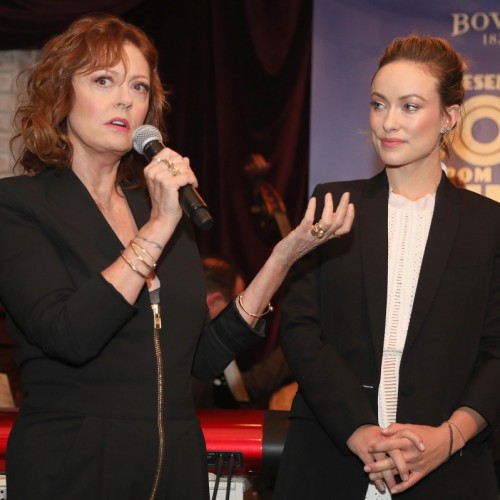Susan Sarandon on new film, single life
LOS ANGELES (Reuters) - Academy Award-winning actress Susan Sarandon plays a widow disappointed in her sons and unhappy with her life in new film comedy, "Jeff Who Lives at Home," in U.S. theaters on Friday.
The film stars Jason Segel as Jeff, a directionless, pot-smoking man who lives in his mother's (Sarandon) basement. Meanwhile estranged brother, Pat (Ed Helms) is convinced his wife (Judy Greer) is cheating on him.
Directed by Jay and Mark Duplass, the film follows Jeff during one day as he embarks on a new path down the road of life upon which he is convinced the cosmic universe has set -- thanks to a series of odd signs.
Sarandon sat down with Reuters to talk about the film, having sons smoking weed at home and what life has been like as a single woman since splitting with Tim Robbins three years ago.
Q: What made you decide to star in a low-budget, independent movie like this one?
A: "I loved all the twists and turns and I was moved by the reconciliation of the family. I was also moved by the questions Jeff is asking. Every film is a different universe, and I thought this would be a fun universe to drop in on."
Q: Most of your time on screen is spent in an office environment while your 'sons' have their own storyline. Did you feel isolated from the rest of the cast during shooting?
A: "She's kind of isolated anyway, that's the point. Everybody in that family has become estranged from each other and is isolated. Even though Jeff is living downstairs, he's on some kind of nocturnal schedule and she's going off to work and really upset she's not able to have fun. But I felt connected to Jason and Ed probably because I saw them off the set."
Q: You have two boys of your own - Jack and Miles. Although they are a younger than Jeff and Pat, did you see any of yourself or your boys in this on-screen family?
A: "No, but my boys in real life are on their journeys too, trying to find a philosophy that gets them off the track of feeling they have to be successful. They have questions because they're sons of famous people, which can be a drag. And they're both artists so they're trying to understand that age old dilemma of art and commerce. I don't mind if they live in the basement, take a stupid job or smoke some weed while they're figuring it out."
Q: Really?
A: "I would rather have them smoking weed than drinking. But I was very clear with my kids that some drugs can kill you the very first time you try them. They're all illegal. At least something that grows and is a leaf is not the same as methamphetamine. You can't just lump them all together. But what I said to my kids was that to have a drink or to smoke, to get a break from your life and to relax is one thing. If you're smoking from the time you wake up, you will not have a life to have a break from. The important thing is to talk about it."
Q: You share a special kiss in this film that may shock certain moviegoers. Were you nervous shooting it?
A: "Not at all. I've been there before on film. I think it's more about the bravery involved with relationships - whether or not you're going to be vulnerable to another person, whether or not you ever want to be intimate with another person. The age, the color is just a detail. It's making that leap in extending yourself to another person."
Q: Physically? Sexually? Emotionally?
A: "It's the connection that's important, I think, as a woman. I love sex, but sex without connection for me is not interesting. When a guy says, 'It was nothing, it was just sex,' I believe that's true for him. It doesn't work that way for me. I could have just sex, but I'm interested in connection."
Q: In 2009 you and your sons' father, Tim Robbins, ended a 21 year partnership. How has it been being on your own?
A: "It's been a lot of different things. It's traumatic and exhilarating. The one thing that's been really clear to me is that you have to think of your own life and your relationship and everything as a living organism. It's constantly moving, changing, growing. I think long-term relationships need to be constantly reevaluated and talked about."
Q: Some people in similar situations feel that they've failed to keep the relationship together. Did you?
A: "Of course you feel like a failure. It's a big deal but again, it's an opportunity to grow. At the end of my first marriage (in 1979 to Chris Sarandon), it was about the loss of ideal, about who you thought this person was. I thought love conquered all and I had to reevaluate everything. And you need your girlfriends, you need to take long, long walks until you're exhausted and no longer freaking out and you hold on until a new dawn. Then you get another chance."
Q: After your marriage ended, you vowed to never marry again. Your daughter (Eva Amurri, 26, whose father is filmmaker Franco Amurri) was married last fall. How was that for you?
A: "She's brilliant. Her views about a lot of things are obviously different than mine. I don't know if that's in reaction to me or that's just the way she came in. She's always been really clear about what she wants, what she doesn't want and she has executed her life in way to move toward that. She's picked the right guy who has the same goals and strategies of life. It's not been traumatic at all. The wedding was fun."








